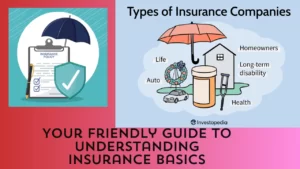5 Insurance Policies Everyone Should Have: Life is full of uncertainties, and while we can’t predict the future, we can certainly prepare for it. One of the most effective ways to safeguard ourselves and our loved ones against unexpected events is through insurance. From protecting our health and homes to securing our financial well-being, having the right insurance policies in place is crucial for a comprehensive risk management strategy. In this article, we will discuss five insurance policies that everyone should consider to ensure peace of mind in the face of life’s uncertainties.
-
Health Insurance: Prioritizing Well-Being
Health is undoubtedly our most valuable asset, and ensuring access to quality medical care is a fundamental part of a secure future. Health insurance provides financial protection against the high costs of medical treatments, hospital stays, and prescription medications. It covers a range of medical services, including preventive care, doctor visits, surgeries, and emergency treatments.
With rising healthcare costs, having health insurance is not just advisable; it’s essential. A comprehensive health insurance policy can help you and your family maintain good health without worrying about the financial burden associated with medical expenses. When choosing a health insurance plan, consider factors such as coverage limits, network of healthcare providers, and the inclusion of essential services.
- Life Insurance: Securing Your Family’s Future
Life insurance is a cornerstone of financial planning, especially for those with dependents. This policy provides a financial safety net for your loved ones in the event of your untimely death. The payout, known as the death benefit, can be used to cover funeral expenses, pay off outstanding debts, and replace lost income, ensuring that your family can maintain their quality of life.
There are various types of life insurance, including term life and whole life insurance. Term life insurance offers coverage for a specific period, providing a more affordable option, while whole life insurance covers you for your entire life and often includes a cash value component. The choice between the two depends on your financial goals and the needs of your family.
- Homeowners/Renters Insurance: Protecting Your Residence
Whether you own a home or rent a property, protecting your dwelling and belongings is paramount. Homeowners insurance is designed for those who own their homes, covering the structure of the house and its contents against perils such as fire, theft, and natural disasters. It also provides liability coverage in case someone is injured on your property.
For renters, renters insurance serves a similar purpose, protecting personal belongings and providing liability coverage. While the landlord’s insurance typically covers the structure itself, it does not extend to tenants’ possessions. Both homeowners and renters insurance offer peace of mind, knowing that you are financially protected in the event of unforeseen disasters or incidents.
- Auto Insurance: Safeguarding Your Vehicles and Finances
If you own a vehicle, auto insurance is not only a legal requirement in many places but also a crucial financial safeguard. Auto insurance protects you against the financial consequences of accidents, theft, or damage to your vehicle. It also provides liability coverage in case you are responsible for injuring others or damaging their property while driving.
When selecting auto insurance, consider the level of coverage you need, including liability, comprehensive, and collision coverage. Additionally, explore available discounts, such as safe driver discounts or multi-policy discounts, to optimize your coverage while managing costs.
- Disability Insurance: Preserving Your Income
While many people recognize the importance of life insurance, disability insurance is often overlooked. Disability insurance is designed to replace a portion of your income if you are unable to work due to illness or injury. This type of insurance provides financial support during periods of disability, ensuring that you can meet your financial obligations even when unable to work.
There are short-term and long-term disability insurance policies, each with its own coverage duration. Short-term disability insurance typically covers the initial weeks or months of a disability, while long-term disability insurance provides coverage for an extended period, potentially until retirement age. Consider your individual needs, occupation, and existing financial commitments when choosing the appropriate disability insurance coverage.
Conclusion:
Insurance is a powerful tool for managing life’s uncertainties, offering protection and financial security for individuals and families. The five insurance policies discussed—health insurance, life insurance, homeowners/renters insurance, auto insurance, and disability insurance—form a comprehensive risk management strategy that addresses key aspects of our lives. By investing in these essential policies, individuals can enjoy greater peace of mind, knowing that they are well-prepared to navigate the challenges that may arise on life’s unpredictable journey.





























